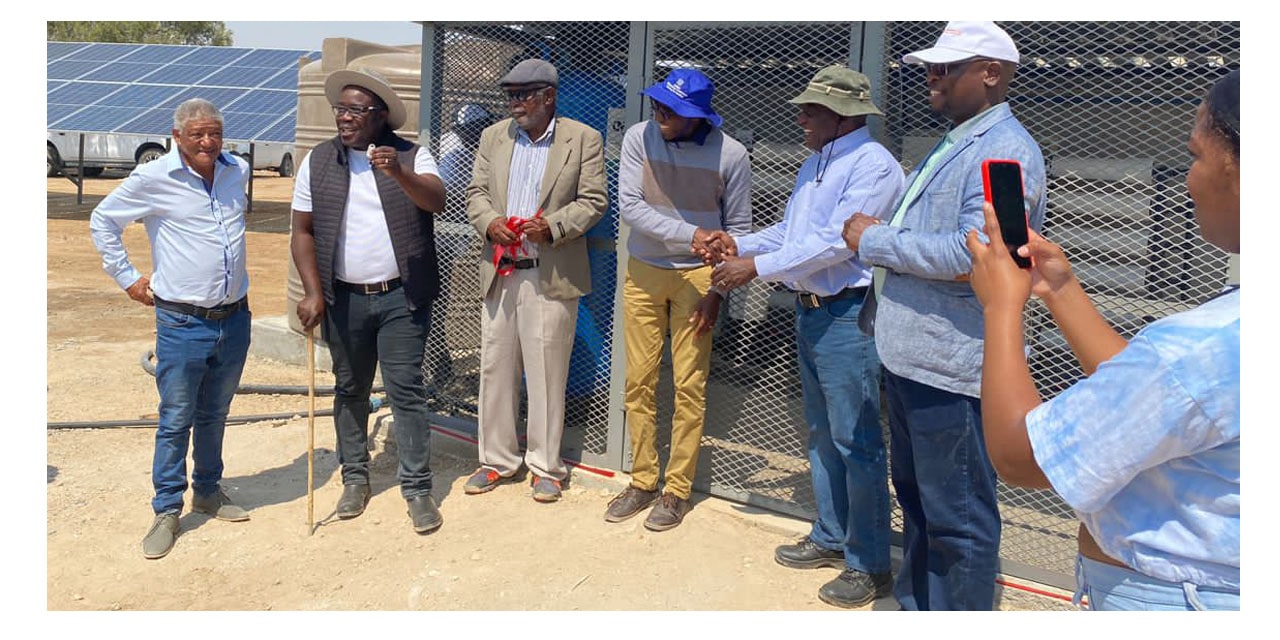Martin Endjala
Three communal farms in the Erongo Region in the Daures Constituency received three mini-desalination units using reverse osmosis to purify water worth N$1 million from the Environmental Investment Fund (EIF).
Vrede, Goeiegeluk Pos and Santamab Pos are among the three communal farms benefiting.
The Erongo region Governor Andre Neville has reiterated that access to clean water is not only a basic need of mankind, but a necessity to sustain all forms of life in the world.
“It is often quite easily forgotten how completely we depend on it. Human survival is dependent on Water,” the governor explained.
Water scarcity and lack of access to portable water by the poor is said to be among the main obstacles to the full enjoyment of the right to water.
Andre said that people’s daily lives revolve around water. “From the moment we wake up to the end of chores each day, we do many things in which water plays a crucial role such as drinking, washing, and cleaning,” added the governor.
Additionally, comfortable and hygienic life come with water, thus asserting that to this end, he is confident that the new water softening systems (mini desalination plants) that have been handed over to the communities will ensure not only easy access to water but also an efficient and a regular water supply system for the whole community.
Andre further pointed out that the initiative is unique as it looks at addressing the Sustainable Development Goal 6, in terms of clean water and sanitation which goes beyond drinking water, sanitation, and hygiene to also address the quality and sustainability of water resources, which are said to be critical to the survival of people and the planet.
The governor accentuated that the 2030 Agenda recognizes the centrality of water resources to sustainable development and the vital role that improved drinking water, sanitation and hygiene play in areas such as health, education, and poverty reduction.
He said the government is cognizant of the threats brought about by climate change and is therefore making efforts to counter these threats, working around the clock with the help of stakeholders such as EIF, to ensure that community livelihoods are preserved.
Speaking during the handover ceremony on Friday Karl Aribeb, Chief Operations officer of EIF, said that the initiative is aimed at relieving the communities of the three communal farms from the plight of hard or saline water.
“This small initiative contributes to a broader goal for achieving universal and equitable access to safe and affordable drinking water for all,” Aribeb pointed out.
The chief of operations further highlighted that Namibia is a water-scarce country and ranks amongst the 30 driest in the world.
Hence, he is urging all stakeholders and implementing partners of the project to ensure that the little water that has been conserved, to be respected, shared and enjoyed by present and future generations in the country.
Ndiyakupi Nghituwamata, Executive Director in the Ministry of Agriculture, Water and Land
Reform, in a statement read on her behalf by Elijah Ngurare Director of Rural Water Supply, Sanitation and Coordination, in the MAWLR, stated that she is very confident that the investment made by (EIF) into these technologically advanced facilities will contribute massively, in improving community livelihoods at these three communal farms.
Moreover, Nghituwamata has urged the community to take care of the facilities that have been
Handed over and to ensure that the facilities are used for the right purpose and to jealously guard the investment made. Headman Benjamin !Naruseb, commented the EIF, for their concerted efforts and dedication in
mobilizing the necessary resources towards achieving national and most importantly regional priorities and objectives, and for arranging this event.!Naruseb said that the ‘’highly appreciate your efforts and accept the funding immensely”.
The Environmental Investment Fund is Namibia’s own response to the growing global need for green financing.
It was established in terms of the Environmental Investment Fund Act, Act 13 of 2001 with a mandate to raise funding for investments into projects and programmes that promote sustainable development.
It is currently one of the fastest growing green and climate financing institutions in Africa.
As part of its vision to be “a recognized leader in the development and application of innovative financing mechanisms to support sustainable development and ensuring inclusive development for all the people of Namibia’’.
To date since inception, the fund has disbursed grants valued at more than N$583 million
Through its financing, 120 boreholes were retrofitted and benefitted more than 77 000 people who now have access to portable water and attracted N$820 million for concessional Green Credit Line with participating commercial bank from Agence Française de Développement (AFD) under the SUNREF project in Namibia.
The fund has also attracted and mobilised more than N$1.7 billion mostly from multilateral and developmental funding institutions and partners.




